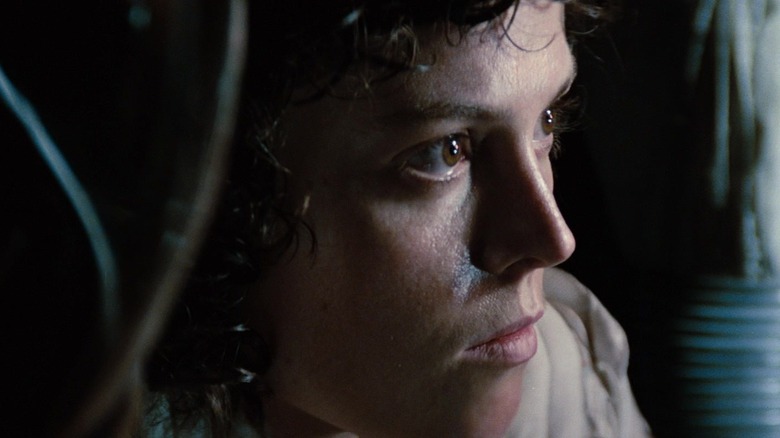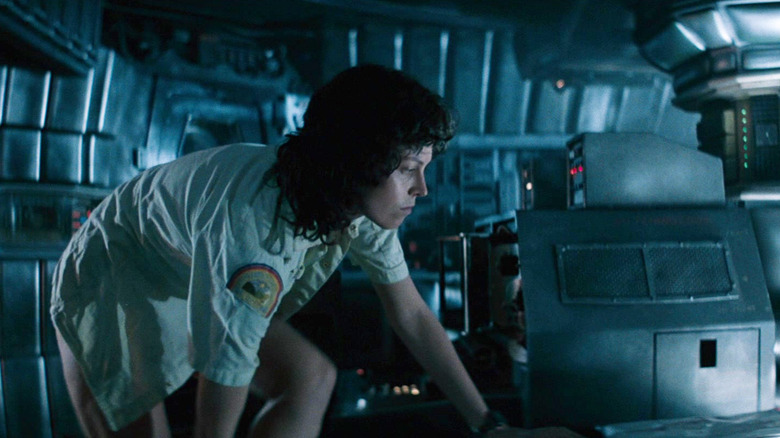Why Stephen King Didn't Like The Ending Of Alien
This post contains spoilers for Ridley Scott's "Alien."
The term "iconic" is often thrown around willy-nilly, but few sci-fi horror films deserve the label like "Alien," which emerged as a genre classic as soon as it burst onto the scene in 1979. Ellen Ripley (Sigourney Weaver) has redefined our understanding of what "final girl" stands for, etching a portrait of level-headed bravery and fearless compassion like never before. After Ripley manages to escape into the shuttle with the Nostromo's resident cat, Jones, in the movie's climax, we are lulled into a false sense of security, as is reflected in the fact that Ripley starts undressing and getting ready for stasis. However, the worst isn't over, as she sees the Xenomorph curled up among the pipes, leading to a nail-biting sequence where she quietly steps into her spacesuit, ready to engage. What ensues is a tense, violent confrontation, but Ripley manages to kick the creature out of the shuttle and blast it into oblivion.
This hard-earned catharsis is one of the many reasons why "Alien" is so memorable. When Ripley anxiously hums to herself while gearing up for battle with such a formidable enemy, we share her white-knuckle fear and desperately root for her to win. Ripley's heroism, however, isn't all guts and firepower; she chooses to defend herself despite being scared out of her mind, actively fighting for survival in a situation nobody in the Nostromo's crew was prepared for. Ripley's hardened will to persist carries over to the sequel "Aliens" and beyond; regardless of what you think about Ripley's arc, she is a complex protagonist who also serves as the blueprint for women characters who can hold their own without being reduced to trite stereotypes.
While the ending of "Alien" is an empowering one, Stephen King seemingly disagrees (or did at one point). King touched upon the film's conclusion in his 1981 book, "Danse Macabre," in relation to a discussion about horror in mainstream literature and cinema (via Collider). Although King praised "Alien" for its artistry, he criticized the end of the movie, calling it "sexist." Here's what the author said.
Stephen King thought Alien's ending twist was gratuitous, but he's wrong
King felt the decision to have Ripley strip down to her slip and underwear towards the end of "Alien" is an unsavory one, as he saw it as a gross manifestation of the male gaze. He also criticized her decision to save Jones in the same write-up:
"[Ripley] steps out of character at the scriptwriters' whim by going after the ship's cat. Enabling the males in the audience, of course, to relax, roll their eyes at each other, and say either aloud or telepathically, 'Isn't that just like a woman?' It is a plot twist which depends upon a sexist idea for its believability, and we might well answer the question asked above by asking in turn, 'Isn't that just like a male chauvinist pig of a Hollywood scriptwriter?' This gratuitous little twist doesn't spoil the movie, but it's still sort of a bummer."
Now, we need to have a conversation about the hyper-sexualization of women in film that caters exclusively to the cinematic male gaze, as these portrayals help reinforce misogynistic stereotypes in real life. That said, Ripley stripping down in the safety of the shuttle isn't a byproduct of sexism, but simply a logical act after enduring unspeakable hell that claimed the lives of her colleagues. In this scene, she is finally able to let her guard down and be comfortable in her own skin, allowing herself to unwind after the endless carnage that has plagued the Nostromo and its inhabitants.
Moreover, her decision to save Jones isn't out of character at all, as it only underlines her empathy during a life-or-death situation where she chooses not to leave a sentient life behind. After all, empathy isn't weakness, nor is it a sentiment reserved for a particular gender. It is also worth noting that Ripley must've felt some amount of guilt for not being able to save her colleagues, which contributed to her decision to go back and save Jones.
Although King (whom I sincerely respect) intimately understands horror and is undoubtedly an expert when it comes to the genre's associated tropes, his perception of this particularly scary "Alien" scene feels a tad misguided. In my opinion, there is nothing gratuitous about a survivor unwinding in a moment of unguarded vulnerability, where she immediately spots danger and slips back into the shoes of a fighter in spite of her visceral fear. What's more, this twist fleshes out the Xenomorph's stubborn insistence to hunt and kill as a species, and its defeat at Ripley's hands leaves us mere humans with the tender hope of survival against the perfect organism.

